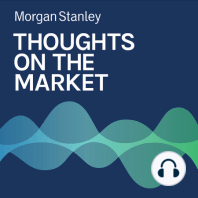3 min listen

Andrew Sheets: Be Careful What You Wish For
Andrew Sheets: Be Careful What You Wish For
ratings:
Length:
3 minutes
Released:
Mar 31, 2023
Format:
Podcast episode
Description
Given recent signs of slowing in a previously strong economy, investors may want to look to history before wishing for weaker growth.----- Transcript -----Welcome to Thoughts on the Market. I'm Andrew Sheets, Chief Cross-Assets Strategist for Morgan Stanley. Along with my colleagues bringing you a variety of perspectives, I'll be talking about trends across the Global Investment landscape and how we put those ideas together. It's Friday, March 31st at 2 p.m. in London. Here at Morgan Stanley Research, we are cautious on global equities relative to high grade bonds. So what would change our mind? We think the bull case for markets is better than expected growth, even if that means higher interest rates. On the other hand, investors should be careful about wishing for weaker growth, even if that would mean easier policy. Central to our thinking is the observation that a sharp slowing of a previously strong economy has repeatedly been poor for stocks relative to high grade bonds. And we think signs of such an environment of a hot economy that's slowing abound. Inverted yield curves, falling earnings expectations, high inflation, tight labor markets, weak commodity prices and tightening bank lending standards are all consistent with a strong economy that's slowing and are all present to an unusual degree. Historically, the-more of these factors one has seen, the worst the forward looking environment for stocks versus bonds. In short, much of our caution is driven by concerns around the growth outlook and its deceleration. So if growth is better than we expect, we think that's a positive surprise. But wouldn't better growth mean higher interest rates, which were bad for markets last year? Shouldn't investors be wishing for weaker growth that would bring back lower rates and policy easing? First, we would view 2022 as something of an outlier, the first time in 150 years that both U.S. stocks and long-term bonds fell by more than 10%. Today, the starting point for valuations in both equities and fixed income is better, leaving more room to absorb the impact of higher rates. Second, the way that stocks and bonds are moving relative to each other is shifting and different from last year. Throughout 2022, stocks generally fell if yields rose, implying higher rates were a concern. But over the last 60 days, stocks have generally fallen with lower yields. That pattern is more consistent with growth being the dominant concern of equity markets. But wouldn't weaker growth help if it meant central banks start to cut interest rates? Here, we think the historical evidence is less supportive than appreciated. In 1989, 2001, 2007, and 2022, the Federal Reserve eased policy as growth weakened. All saw stocks underperform bonds, consistent with our current recommendations. In addition, the amount of easing already expected by markets matters. U.S. markets are already expecting the Fed to cut rates by about 1.7% over the next two years. Such large easing doesn't match times when relatively smaller levels of rate cuts did boost markets like in ‘95, ‘97, ‘99 or 2019. In short, we think the bull case through markets lies through growth that's better than our economists expect. Hoping for weaker growth and lower interest rates that might go along with it has a more volatile track record. Be careful what you wish for. Thanks for listening. Subscribe to Thoughts on the Market on Apple Podcasts, or wherever you listen, and leave us a review. We'd love to hear from you.
Released:
Mar 31, 2023
Format:
Podcast episode
Titles in the series (100)
Mike Wilson: How Confident Are U.S. Businesses in the Economy? by Thoughts on the Market